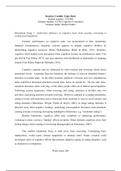Student: Camilla Tepin Rizzi
Student number: 2253488
Seminar number: 6 (The Cognitive Consumer)
Seminar leader: Ruthie Pliskin
Discussion Essay 1: Ambivalent influence of cognitive load: from causing overeating to
resting food temptation
Farmers’ performance on cognitive tasks was proportional to their momentary
financial circumstances: monetary concern appears to impede cognitive abilities by
diminishing cognitive resources (Mani, Mullainathan, Sharif & Zhao, 2013). Similarly,
cognitive effort hinders taste perception when cognition focuses on simultaneous tasks (Van
der Wal & Van Dillen, 2013), and may interfere with likelihoods of elaboration of tempting
stimuli (Van Dillen, Papies & Hofmann, 2013).
Cognitive capacity may be obstructed by info-overload and worrying, which lower
attentional levels. Assuming from the literature, the feelings of concern disturbed farmers’
attention on mental tasks. In the other research, attention’s division onto two simultaneous
tasks could have decreased attention towards taste, hence its sensitivity. On one side, taste-
sensation decreases when worrying, on the other, people often eat to distract preoccupations.
Following current arguments, when worrying and eating, attention is divided onto two
activities, decreasing attention towards worrying. However, initiated as a coping mechanism,
eating to lower self-awareness and to dissociate from emotions is seen in social anxiety and
eating disorders (Hinrichsen, Wright, Waller & Meyer, 2003). In binge eating, attention is
directed away from negative feelings: underlying preoccupation decreases taste-sensation,
causing extreme overeating (increasing maladaptive behaviours, e.g. “emotional eating”).
Besides limitations, cognitive effort may contribute to enhancing performance.
Listening to music can have “doping” effects on sports. Music distracts cognition away from
feeling fatigue when running or exercising (Karageorghis & Ntoumanis, 2007).
This enables attentional focus to shift away from exercising. Considering these
implications, would music distract temptation or obstacle taste? Future research could
investigate types of cognitive efforts that promote adaptive-coping in eating disorders, such
as distractors to temptation.
Word count: 266





